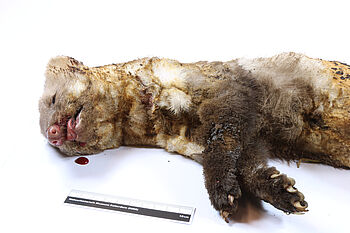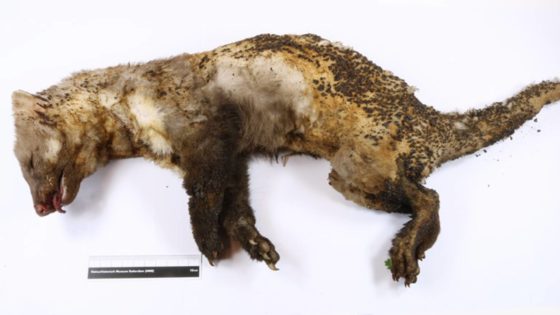Natural history museum bags electrifying new addition to collection

 The stone marten which plunged much of the Achterhoek in Gelderland into darkness on Tuesday morning by making its way into an electricity substation, killing itself in the event, has joined the Rotterdam Natuurhistorisch museum’s collection of ‘Dead animals with a story’.
The stone marten which plunged much of the Achterhoek in Gelderland into darkness on Tuesday morning by making its way into an electricity substation, killing itself in the event, has joined the Rotterdam Natuurhistorisch museum’s collection of ‘Dead animals with a story’.
No one knows how the animal managed to get into the substation but once inside it short circuited three 10,000 volt transformers, leaving the inhabitants of Borculo, Ruurlo, Mariënvelde, Beltrum and Neede in the dark for some hours.
It did not take museum curator Bram Langeveld long to scoop up the animal for the museum’s collection where, once out of the museum fridge and prepared, it will join other hapless victims of electrical and other mishaps.
‘We have quite a lot of experience with electrocuted animals in our collection. A typical characteristic is the smell of singed hair. This stone marten also had that unmistakable smell,’ Langeveld said.
The stone marten has no pelt or whiskers left to speak of and its cramped posture and charred feet speak of the enormous heat to which it was exposed, Langeveld said. It must have died instantaneously and is not likely to have suffered, he said.
Director of the museum Kees Moeliker is happy with the new addition. ‘It’s another sad but illustrative instance of the clash between people and animals. Even now, in 2021, this hapless stone marten reminds us that we should pay more attention to the wildlife around us.’
The High Voltage stone marten, as it has been dubbed, will be joining the CERN marten which paralysed the Large Hadron Collider in Switzerland and the Groninger electro marten which plunged the teaching hospital in the provincial capital into darkness.
The collection is also home to the electrocuted Verduisterduif (black-out pigeon) which affected street lighting in Friesland, Ameland and Terschelling and the Geschokte Rat (shocked rat) which gnawed through the cables providing electricity to some 9,000 households in Zeewolde and disrupted mobile phone signals in January last year.
The first addition to the collection in 2021 is the Face Mask gull which was hit by a car and was found to have the elastic band of a ‘carelessly discarded’ face mask wrapped around one of its feet.
The Rotterdam Natuurhistorisch will not reopen until the lockdown is over but meanwhile the collection can be enjoyed online.
Thank you for donating to DutchNews.nl.
We could not provide the Dutch News service, and keep it free of charge, without the generous support of our readers. Your donations allow us to report on issues you tell us matter, and provide you with a summary of the most important Dutch news each day.
Make a donation